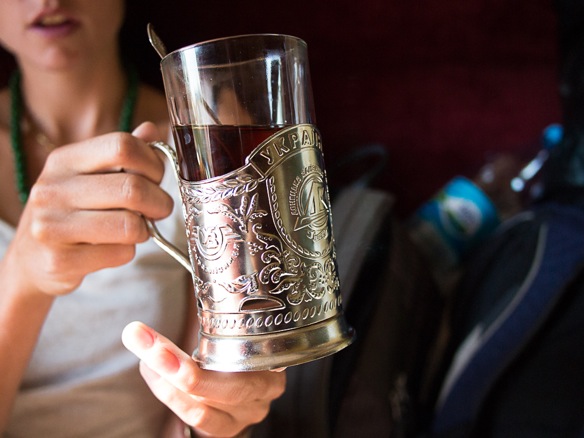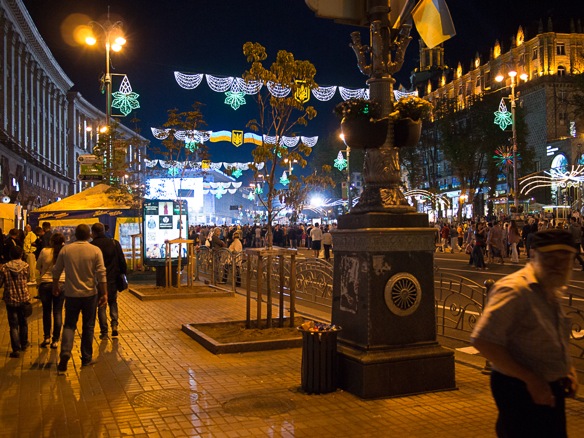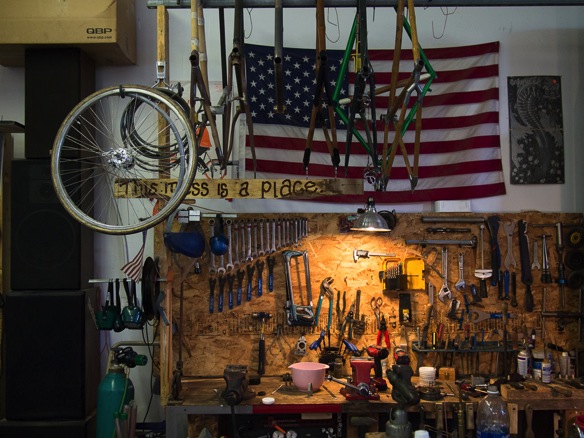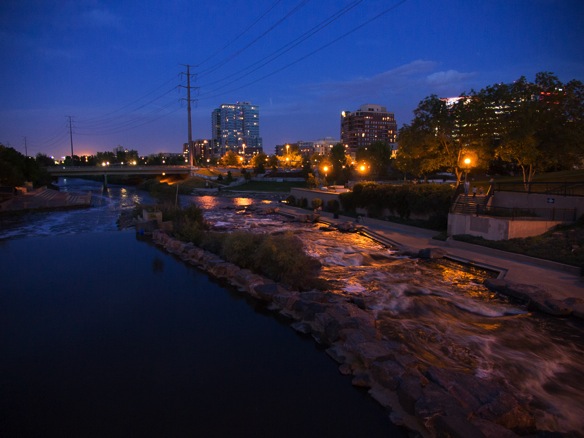
In the past, especially in America, I have become a part-time recluse on tour. Eating a yogurt outside the grocery store somewhere in the U.S.A, a man asks where I am going, where I am coming from, where I sleep, and my favorite, “What do you eat?” He pokes and prods, asks if I have a place to sleep for the night (he’s not offering), and then warns me that it is expected to rain. All the while, I just want to eat my yogurt.
In Albania, I’ve become an extrovert. I’ve learned to pass through villages dragging my brakes to bring attention to our arrival. I’m grateful for my unusually loud Hope freehub, which attracts the attention of every dog in earshot, and thus, every young boy, man, and woman. In remote mountain communities, I purposely ask for water when I don’t really need it to get a better look at the beans that are drying near the house, or the grapes hanging from a trellis overhead. Even so, part of my interest in the grapes is feigned, to get a better look at the young boys, who I know want to get a better look at me, and my bike. I want to meet the women of this country, who spend much time out of the public space. I want to see how people live and eat. Old ways are still alive in Albania, and more than anywhere I’ve been, I want to see it and learn about it.
Albanians reciprocate my curiosity, and fuel it, with the most legendary hospitality I’ve experienced. They invite us inside long before we exchange names or they learn where we are from. They feed us in heaping piles of food, a purposeful gesture to treat us like royalty. They pour us round after round of homemade raki, not because they want to drink with us or get us drunk, but simply because the glass is empty. As in many places, the most open and honest people live in the mountains. For several days in Albania, in between memorable dirt roads, singletrack cattle trails, and serpentine pavement, we’re willing hostages of energetic Albanians. In two days, this happens with the regularity and substance of three square meals a day.
Leaving Kukës, we immediately shoot for a series of small dirt roads near the border with Kosovo. There is an obvious secondary road which travels south, which is surely quiet, and paved. But it has been too long since a proper ride in the mountains. The weather is good and we wish to prolong our time in Albania. The best way to do this is to go high and accept the pace of the mountains.
Our route from Kukës to Cajë includes a total elevation gain of 6,000ft, climbing on dirt roads to Xhaferaj, and then footpaths and cattle trails up to the grassy mountaintops. From there, we continue on little-used dirt roads up near our high-point at 6,900ft. There we find an array of 13 mushroom-shaped bunkers, and a shepherd with a large flock of sheep. The high peaks of Macedonia and Kosovo loom in the distance. Like an afternoon snack amidst the regularity of our three-times-a-day meetings with Albanians, he asks us to sit with him in the grass. There isn’t much to say, and I don’t have any cigarettes to offer him. We spend a few minutes sitting in the grass, the wind blowing just strong enough to erase the intensity of the sun on this fall day in the mountains. And then, we’re off with handshakes and goodbyes. We descend 5,000ft back to pavement.
From Kukës, we pass under the highway and onto a freshly paved road. There are several small border crossings in this region with Kosovo, although the roads to the border are unpaved.

Passing a small crossroads and the intersection of two streams, we ride around an industrial structure. It appears to house some water catchment and distribution systems. We continue on one of two dirt roads at the end of the pavement.

The road turns up, steeply, towards Topojan and Xaferaj.



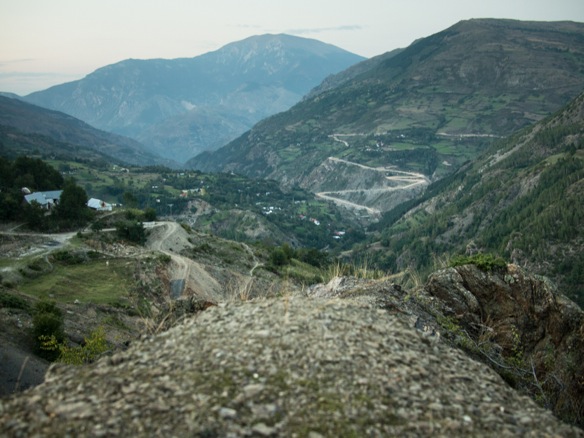
Above both villages, at dusk, we find a small flat spot on a narrow ridge, just off the road. I expect the road to run out soon, and I’d asked a young man who spoke English if we could camp somewhere nearby. He laughs, and says “anywhere”. He invites us to come back down to the store to have a beer with him. He and a few others from the city live in the area during the construction of some water utilities.
Within a few moments, some boys arrive to see what’s happening. A man in his mid-thirties arrives, and takes control of the conversation. He invites us to come stay at his house. We like our campsite, and gratefully decline. He is not satisfied, and tries to invite us again, injecting a little more vigor into his invitation. Again, we decline.
Next, he warns us that the area is not safe. I insist to know why.
He suggests there are some people around here which make it unsafe, and there are animals, and it will be cold. A small crowd of young boys show no concern, and are watching with blank faces. I insist to know who we are worried about meeting in the night? “People!” And which animals? “Beers!”
“Bears!”, I exclaim, correcting him like every other non-native English speaker who pronounces bears like a refrigerator full of cold pilseners.
Listen, I am from Alaska. I’ve seen bears. I will not be cold. Thank you, but we will stay here tonight. I think it will be safe.
By now, he’s using Google Translate on his smartphone to translate more advanced concepts. We both wait, staring at the phone as it slowly loads. “Pity”, it reads.
I now understand his motives more than before. He wants us to come to his house, and to be his guests. He may think it is cold and perhaps he would be afraid to sleep outside, but these are not actual concerns.
Soon, an older man in a camouflage jacket arrives, speaking assuredly in Albanian and carrying a tall wooden staff. At the instruction of our captor, he is now telling us to take our things to come to his house (or perhaps this is another house). Lael points to the tent, and says that this is our home. He looks at it, runs his hands along the thin nylon fabric, and scoffs. He reaches to begin pulling out the stakes. I put my foot down, literally. The young boys are quietly laughing to one another, which after all the talk of bears and unsavory characters, I’m now convinced cannot be true. After a short fight, the old man quits. Our captor leaves us to our pitiful campsite, high on the hill. He leaves us after a half-hour of frustrating, if hilarious, conversation.
Pasta is boiling, night has come. Another man arrives with his two sons to insist that we come to his house. He is softer in his approach, and kind. I thank him generously, stuffing my hand into his with as much confidence as I can muster after a 3,000ft climb and a tiring conversation. He understands, I think, and leaves us.
Our food is salted and vegetables cut. Nearly as my spoon enters my mouth, two boys are at the roadside. These are the two boys that had been here moments earlier with their father. One of them has been there since the beginning, and knows the entire history of the situation. I stand guard, ignite my headlamp and engage them, preparing for a fight. They offer a large packaged chocolate croissant and a liter of peach juice, purchased from the store below. “Thank you.” They leave us alone, and the village leaves us alone.
Everyone in this valley now knows who we are and where we are camped. Surely, we are safe now.
We finish our dinner. A truck arrives with two men. The driver is the young man who we’d asked about camping earlier in the evening. It seems a group of people has been waiting for us at the store. He offers us a ride –no more than 250m– which we decline. We clean up and ride down the steep dirt road. Inside, a half-dozen men are waiting, with only a few beers in circulation. They pretend not to be waiting for us, but they are. We enjoy a pleasant conversation with our host and his friend, the store owner. His family is from this area, but he lives in Tirana. We ask all of the things which we haven’t been able to ask for days. He is intelligent and mature, and we learn, only 21 years old. Another man in the room that arrived on a loaded horse, looks at us smartly. He’s a shepherd or a farmer, but claims to have been a teacher at some point. He speak a little English, and writes a note on a napkin. He looks exactly like our friend Eddie from Key West. Actually, everyone in the room is healthy and well dressed, in a way that wouldn’t be out of place in a bar in Fort Collins, although this is a really small village at the end of a dead end dirt road in a very steep valley in Albania. We are not allowed to pay for our beers, but I insist to leave a tip equal to the price of the beers. I explain, this is how we make our money in America, and they laugh.
If we want coffee, we are told that the shop owner will return at 7:30 in the morning. As we thank the group and begin our ride up the hill, Lael and I agree that they probably don’t normally open at 7:30 or serve coffee. In the morning we arrive for our coffee as prescribed. The store is open, which I could see from our vantage on the hill. The shop owner has spent the preceding 20 minutes smoking a cigarette and looking in the general vicinity of our camp. He opens a fresh pack of Turkish coffee, lights the stove, and pours the boiling liquid into two small ceramic mugs. He offers each of us a slim cigarette, turns on the TV and selects an English-language music station. He quietly retreats to keep watch behind the counter. Again, he will not accept money for the coffee. Instead, we buy a few packaged croissant at his store.

The road ends a quarter-mile after the store. Only three or four houses line the road beyond our camp. As we’ve been warned, the route to Turaj is not passable. I ask for clarification that in fact it is not passible with a truck.
“With a horse?” Yes. “On foot?” Yes. “Might it be possible to walk my bicicleta?” Most likely.
At first, the path is steep and muddy, rutted by horses and cows. Then, it is rocky, like a narrow old wagon trail. It becomes more level and smooth, rounding the hillside like an engineered rail trail. Finally, it diverges into several narrower tracks, footpaths and cattle trails. We select our path via the GPS, which actually indicates a trail up the mountain.








At the top, we encounter a series of small dirt roads, broad grassy meadows, and a cemetery. We navigate a network of dirt tracks upward. Passing through the community of Kodra, I stop for some water at a house.

In moments, a young girl is fetching a watering can to fill our bottles. The older woman, weathered but no more than 40 years old, takes Lael by the hand and seats both of us inside. She suggests, offers, insists that we will have some coffee as she lights the stove. The wood stove in the center of the room is warm, and a large pan of milk sits atop it.



I admire the space and the hand-carved wood panels which make the walls and the cupboards. The building has settled over the years, the ceiling is sagging. The floors are dirt, there is a television in the corner. We poke and prod at the silver cylinder on the floor. It is powered and purring. A laundry machine? A sanitizer for canning? Eventually the woman opens the machine to stir it and reveals a quantity of milk, on its way to becoming yogurt. The table is populated with bread and butter, yogurt, cheese, and one spicy yellow pepper. Two glasses of milk arrive, and two coffees. And then we eat, and everyone watches. The neighbor children arrive to watch, as does an older woman who smiles a lot and makes conversation with us in Albanian.

Everywhere in the Balkans, Turkish style coffee is prepared on a small high-heat burner. The recipe seems to call for sugar and coffee and water in equal proportion. Only the size of an espresso shot, it should take some time to consume, often up to an hour or more.



The road trends upward with the gentle curve of the hills. Ridable rural dirt provides us with some of our happiest moments on the bike. We’re part time mountain bikers, and cities are becoming more appealing to me while on tour, but this is the kind of riding we love. We can talk and think, and for only a few minutes at a time serious attention must be paid to the ride.

Juniper berries, ripe and ready to become raki.

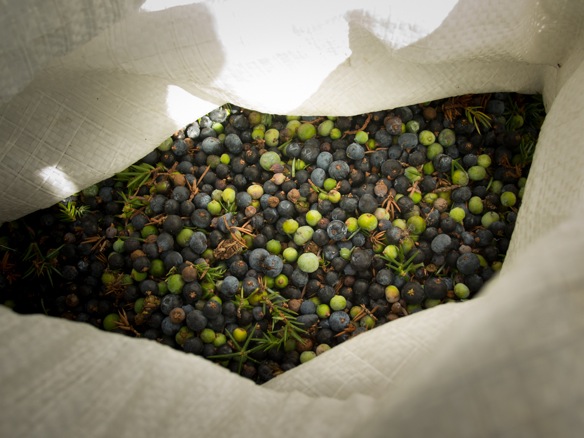

An assortment of dirt roads and cattle trails take us to our pass. We have several options down the mountain. With several hours and warm weather, we shoot for a longer route to another road further south. This should bring us another 1000ft higher.

A large concrete structure stands atop one of these mountains, most likely an old military facility. The three-way border of Albania, Kosovo, and Macedonia is nearby. In recent history, this was simply the border between Albania and Yugoslavia.

The last ride (or push) is up a steep 4×4 track to 6900ft. This will be our highest point in the Balkans, and in Europe.

At the top we break for some olives and almonds and admire our good fortune. An array of concrete bunkers loom at grass height.

There are thirteen on the distant hill, the most I’ve seen in one place.

Just as soon as we begin down the mountain, a shepherd stops us to “chat”. We sit quietly in the grass for a few minutes. I indicate that we are from Alashka, Amerika. I point towards Greqia. He understands. We roll on.


The GPS indicates a track of some sort. There is a feeling to the grassy hillside that makes me think we are following something, but the complex of cattle trails is deceiving. Nonetheless, we can see where we are going. Much of the steep meadowy hillside is rideable in a switchback pattern, although a bit technical.


Two cattle trails do not make a doubletrack, but my eyes hoped that this would be a “road” down the mountain.

Instead, we continue overland down to Cajë.
 ë
ë

And down the valley back towards the pavement.






Immediately, the paved road climbs toward a pass. We stop in Bustricë for a beer, and let the light fade without a plan or a place to camp. In time, the men at the next table warm up to our presence and ask where we are from. They buy us another round of beers. They send a plate of feta and olives to our table. After I quickly eat everything on the plate –Lael gets none of it– they ask if we’d like another. They invite us to their table, buy another round of Skopsko pints, and we talk. We learn that the bar owner has provided the beers, while his brother bought the olive and cheese plates for us. His son is serving us, and speaks excellent English. His other son, we met by the roadside as we entered town.
I eventually ask for a place to camp nearby, something simple. They show me a place in the field across the street. Perfect. But within minutes, they’ve reconsidered. You will come to our home.

We walk up the hill to the house. It is nice and modern, simply furnished and open. The door is wide open, covered in a thin fabric like a veil to maintain the flow of fresh air into the house. We remove our shoes on the porch. The man’s wife and his mother greet us. We all sit down, drinks are procured and seats arranged around a small table taken from the corner. The room is large with a kitchen along the far wall, and couches along two walls. No permanent dining table is present.
It isn’t long before the likelihood of an oncoming feast is impossible to ignore. Plates and piles of food are growing on the counter. The oven light is on. The men in the room, and Lael, are drinking and smoking and talking. The women are cooking but when they come to the table to socialize, they borrow a beer or a glass of raki to join us in a toast, “Ge zuwar!” They don’t drink. We are instant friends.
Dinner arrives, piece by piece, beginning as a hearty meal and growing to a modest feast, and then, an epic feast. At one point, Lael is filled to the brim. She sips a glass of water and pokes at some cucumbers and tomatoes. Someone reaches across the table to pile more meat and potatoes on top of her heap of food. That’s the Albanian way. Despite what you’ve heard, hospitality is the only hazard in this country.
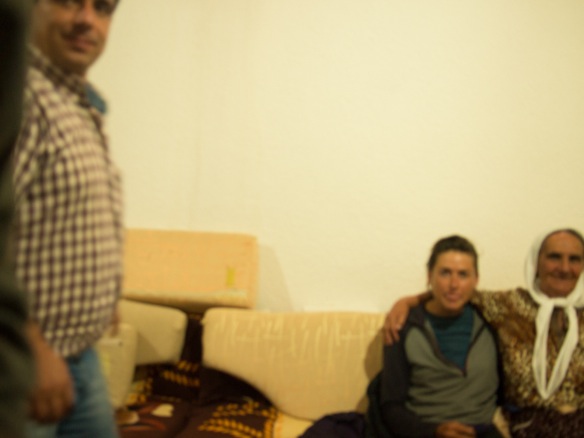




Official photos are taken, and as has become habit, Facebook contacts exchanged. The two boys, who have just come home from working at the bar are told to sleep on the couch. We are told to sleep in their room. The man’s mother– the grandmother– gives Lael a pair of knit slippers.

Lael’s had a big day, on the bike, and off it.

The following morning we make one last stop at the bar-cafe. Another round of drinks–coffees this time– for which payment is refused. I leave a tip in excess of the price of the coffees. The money is declined. I insist, it is a tip for their son Kevin, who uses this English variant of his Albanian name in our presence. He is only 18, but is living in Tirana to study English. I insist, this is how we make our money as well. Lael and I are assured in this gesture, thinking about the money she makes as a server or bartender in Alaska or elsewhere in the US.
We continue south towards Peshkopi, near the border of Macedonia. The plan is to stop in town, briefly, and ride across the border.

We stop for coffees along the way, equally interested in the stone structure as in the group of men outside the rustic shop. Each is a good excuse to enjoy the other. The shop owner sends us with a bag of acorns.

We break for lunch at a large communist-era monument on a hill between villages. We cook the remaining sausages in my framebag, cut vegetables and cheese, and make a palatable expression of a bunch of two-day old food and plastic grocery bags.

It is not long before the sound of young boys enter our space. We hear them, and soon, we see them. Nine boys are standing within feet as we consider eating lunch, trying to eat lunch. They don’t say anything– we speak to each other knowing they can’t understand, laughing at our situation. Even between villages at the top of the hill out of site of any homes, they’ve found us. Most of the time, young boys and dogs are best at sensing or expecting our presence. Young boys are often the most talkative. But not these boys, not yet.
“Hello, where are you from?”, one boy asks, without the capacity to make further conversation. But we point and shoot and learn a few Albanian words as they share their English vocabulary with us. Lael assumes the role of English teacher, which she declares is much more productive in Albania than it was in France where she worked for seven months. Soon, they are asking for pictures to be taken in front of the monument. They become boisterous, fighting and laughing with one another. Some boys are older, and some younger; some are extremely talkative and organize the group, while one boy does not talk at all.
The energy in the group grows to a high. I pull the bag of acorns from my bag to offer a snack. They plainly refuse, an official policy I suspect. Instead, I ask them to show me how to shell the nuts. Then, I ask for their help to shell them all. Soon, nine boys are (almost) quietly shelling my acorns, although most of them will not eat the nuts. A few boys eat some. By now we are friends, and Lael and I have lost interest in our lunch. We cut our sausages into pieces and offer them to the boys. Now that we’re friends, they accept, reaching and grabbing past each other. Lael signals to quiet down and to only take one piece at a time, generally polite practices. Instead, they take one sausage and hide it behind their backs, reaching with the other hand. The same happens with our raisins, and almonds. Preparing to leave, I pull out my stack of photos. These are test prints and rejects from The Art of Bikepacking show I presented in Anchorage this summer. Nine of those photos are now in a small town in Albania. Nine Albanian boys have photos of Lael pushing her bike somewhere in Belgium, Luxembourg, Poland…


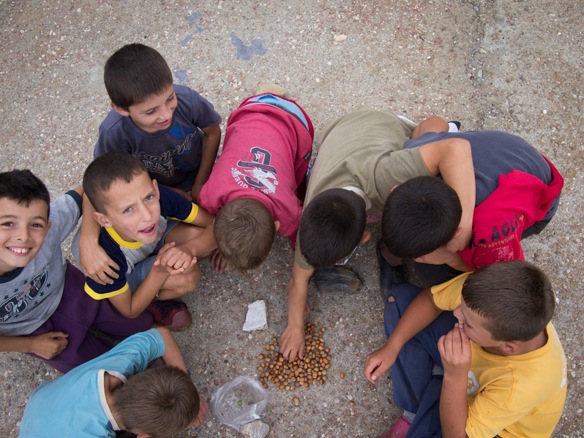
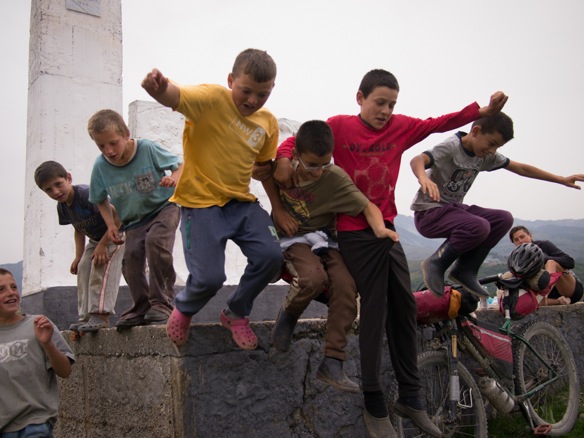

Near Peshkopi, a young man pulls over to the side of the road to talk. “German, English… French?”, he asks hopefully. He speaks nearly perfect French, the result of having lived and worked in Paris for three years. He is only 19 years old, at home for some time to visit his family and rest his ankle after an injury. He and Lael hold an energetic conversation. He verifies the Albanian principles of hospitality that we have recently experienced, and suggests that he will return to the city in an hour to meet us and show us around. Tentatively, we agree.
After shopping for supplies (mostly burek and apples), we look about the city for some internet and a coffee. We take our time, and have one last look near the plaza to see if Bajram, or Brian as he is called in France, has arrived.
We find him and are invited to sit with him and his friends for (more) burek. We talk, several hours pass. Again, it is dark. There is some discussion about “hearing some music” at the discotheque across the street. After some time, we descend a staircase to a club under the Grand Plaza Hotel of Peshkopi. Music is at full volume, and nobody is in the nicely-appointed room. Mirrors and curvilinear seating and small tables line the wall around a central dance floor. The bartender, also the DJ, gladly invites us. We are a group of four young men and one girl who hasn’t showered in weeks, wearing muddy Sidis. We’d inquired about the club scene earlier in the evening. It seems it is hard to meet girls in this city– a small city in the generally Muslim country– much unlike Tirana, or Paris. Here, girls don’t go to clubs and if they did, people would talk.
We have a nice time, Lael and I incited a brief dance party with our friends, and we listen to some really loud music. Bajram leads us in a traditional Albanian wedding dance to the heavy beats of of a traditional tune over a modern track.
All the reasons to go on a bike trip cannot be known from your current vantage.

We pile out of the club with the authentic energy of a whole night in some big city discotheque, as if it were 5AM. The streets of Peshkopi, just past 11PM, are vacant. The plaza is quiet.
We arrive at Bajram’s house near midnight. His mother is awake and waiting for us. We sit on the couch. A table appears along with a feast of cheese and yogurt, vegetables, and fasole, a traditional bean soup. Bajram opens a bottle of wine, although we can barley keep our eyes open. He and his mother quietly enjoy our company while we eat. We ask to sleep and are given a spare room in their spacious home.


Early the next morning, under foggy skies, we make a break for the border of Macedonia. Thanks, Albania, it’s been great.


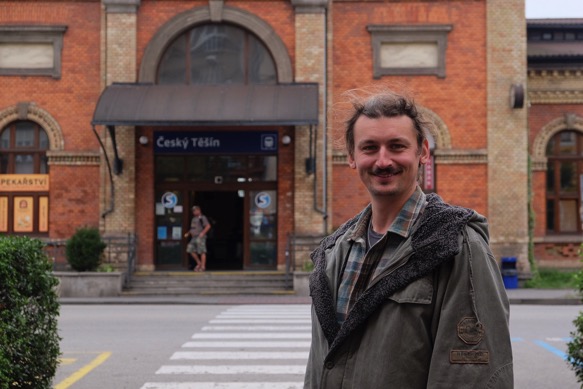






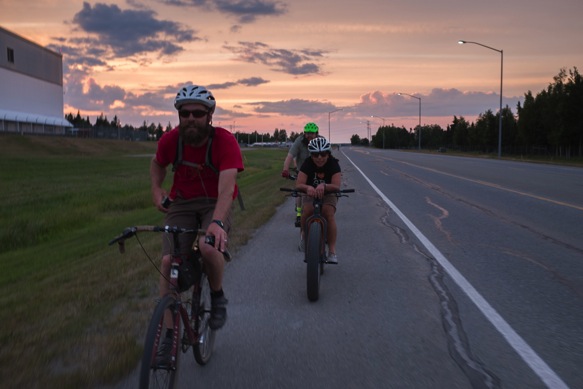



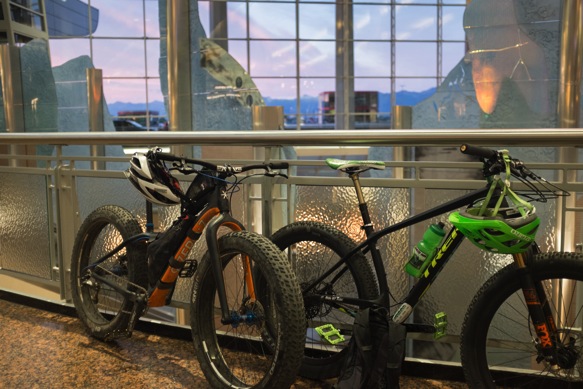

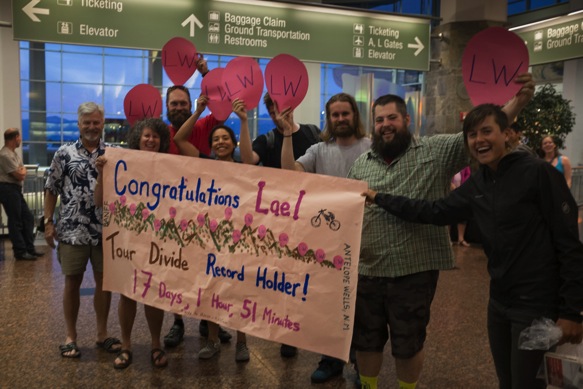











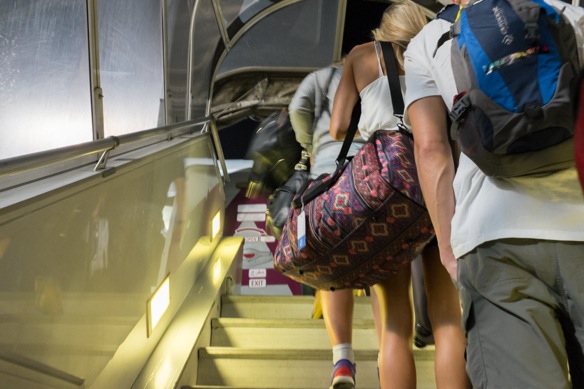

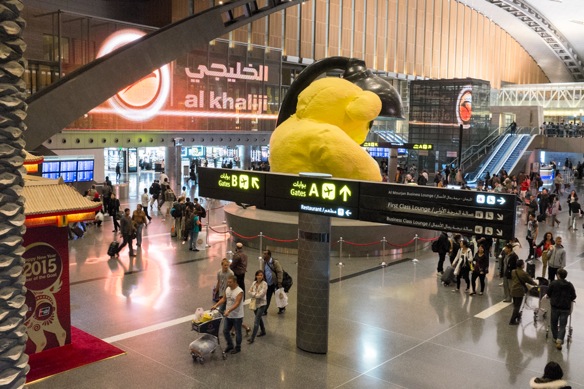
































































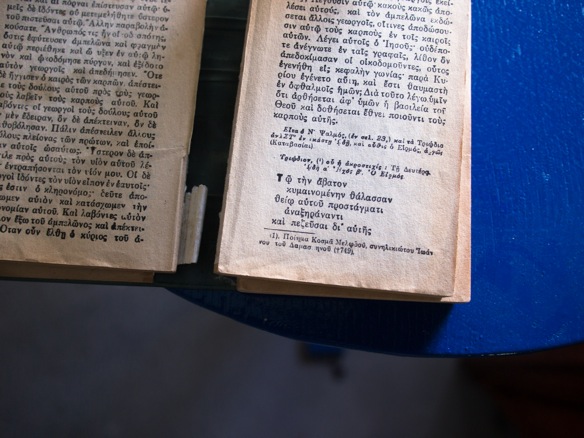
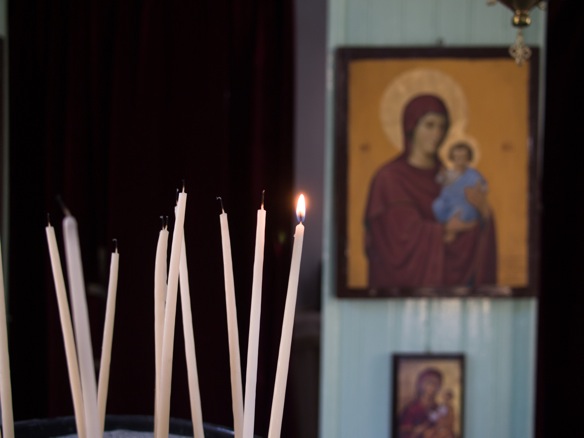



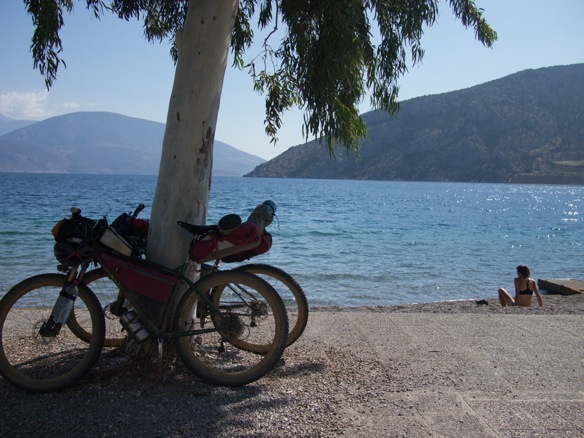
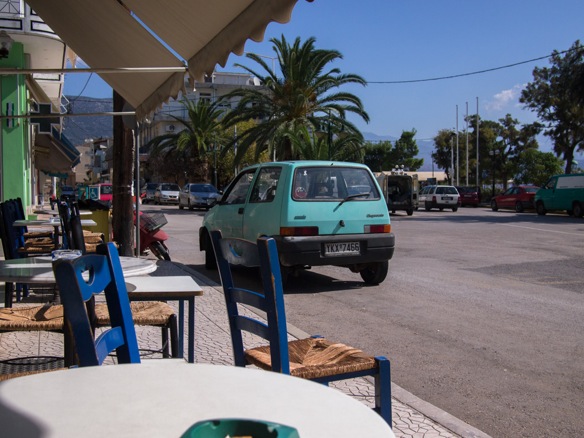

 ‘
‘





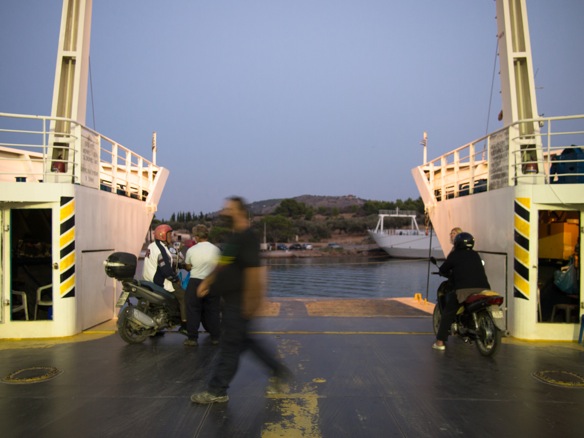








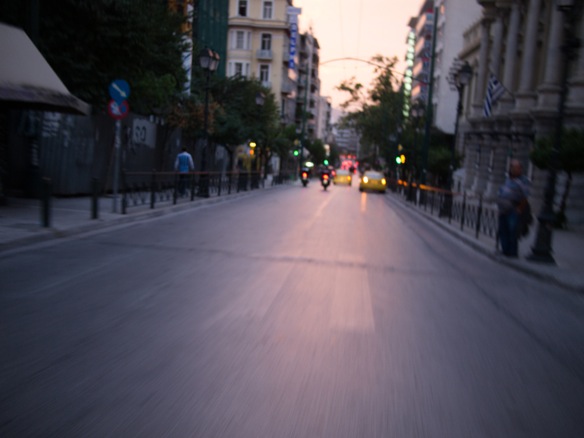




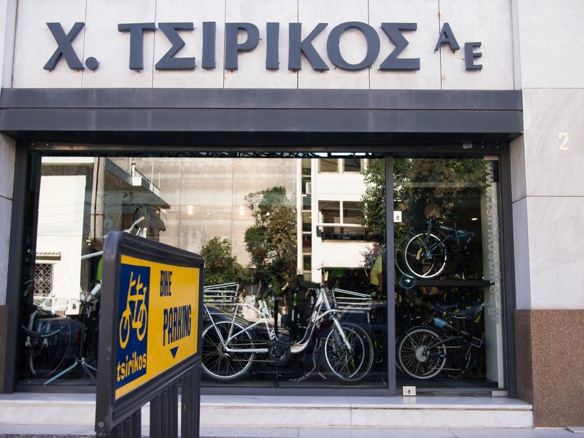







 \
\


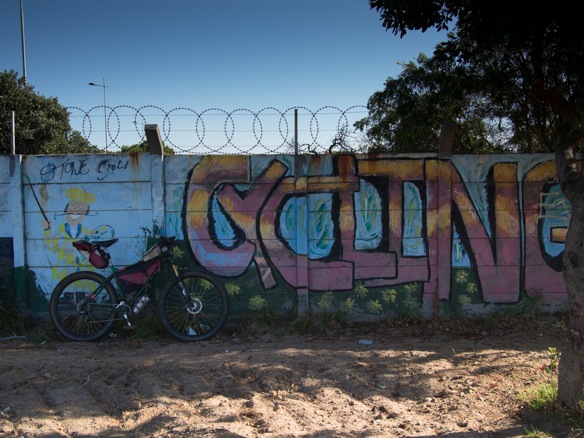














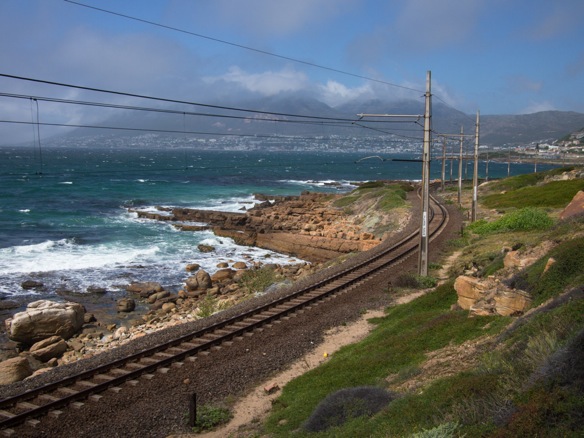






































 ë
ë












































